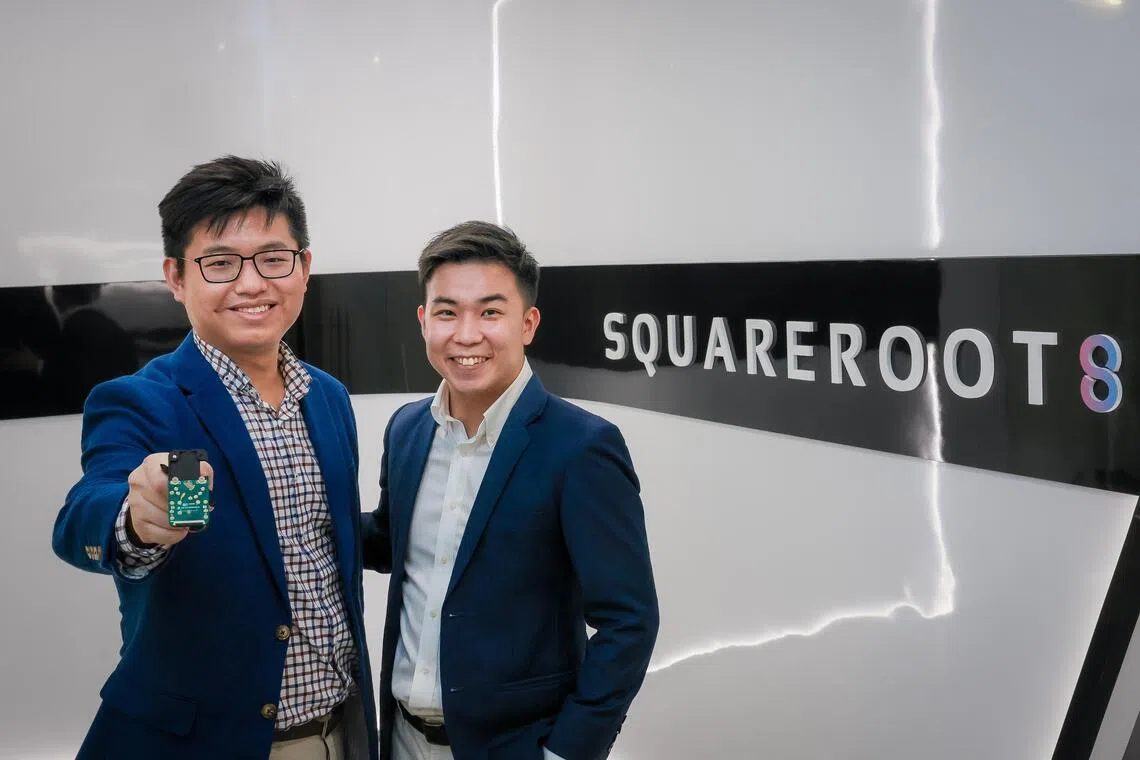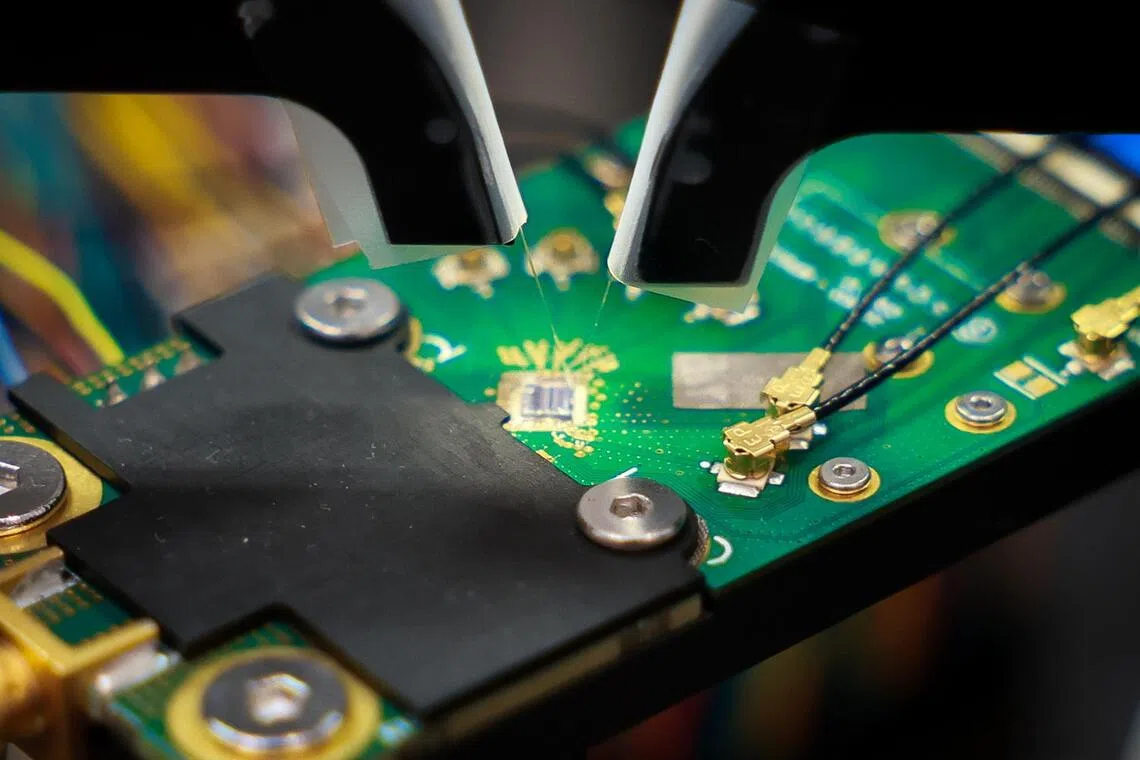Singapore quantum tech start-up aims to make critical systems unhackable
Sign up now: Get ST's newsletters delivered to your inbox

Squareroot8 Technologies CEO Cristofer Quek (right) and chief technologist and co-founder Goh Koon Tong at the company's launch event on Sept 26.
ST PHOTO: GAVIN FOO
SINGAPORE – With a $3 million funding from the National Research Foundation (NRF) and after six years of tinkering in the depths of a laboratory, a home-grown start-up is ready to launch services that can protect critical information systems in a way that makes them almost unhackable.
Squareroot8 Technologies, a spin-off from the National University of Singapore, is in talks to test its quantum cryptography technology with undisclosed firms in the healthcare, defence and finance sectors here.
Its newly launched product, dubbed the Quantum Random Number Generator (QRNG), uses algorithms that take advantage of the inherent randomness of quantum mechanics to encrypt data.
The result: a string of numbers that is so random that it is impossible for hackers to guess the sequence to decrypt the protected data.
“We use random numbers in our everyday life. They are used to encrypt video calls or communications on our mobile phones,” said Squareroot8 Technologies co-founder and chief technology officer Goh Koon Tong.
“The higher the randomness, the more secure the encryption is,” he said.
Unlike QRNG, current encryption methods often rely on the difficulty of mathematical problems to keep data safe, said Dr Goh.
But these mathematical problems, or algorithms, are predictable. As such, current encryption methods are vulnerable to quantum computers.
Quantum computing holds the promise of carrying out calculations that would take today’s systems millions of years to do so. They could lead to the faster discovery of new drugs or green energy materials, and better artificial intelligence (AI) models to detect software bugs, cancer cells, hate speech or fraud.
By 2040, quantum computing is expected to create US$450 billion (S$581.5 billion) to US$850 billion of economic value, according to a 2024 report by Boston Consulting Group. Economic value is the value of an asset calculated according to its ability to produce income in the future.
Bad actors can also use quantum computers to break current encryption methods, and this possibility is not too far away – expected by 2030 – requiring a new way of securing data.
Work on QRNG started in 2018 at the NUS Department of Electrical and Computer Engineering, together with the school’s Associate Professor Charles Lim.
In 2019, Prof Lim was awarded an NRF fellowship and a grant worth $3 million, which gave their research work the much-needed boost.

Squareroot8 Technologies’ chip-based Quantum Random Number Generator, during a showcase in its lab at Alice @ Mediapolis on Sept 26.
ST PHOTO: GAVIN FOO
When Squareroot8 was formed in 2020, it acquired from NUS an exclusive licence for the technology that would be key to developing QRNG. The team also received US$3 million from private investors via seed funding in 2022, though Dr Goh declined to reveal specific companies.
Although the quantum cryptography market is still nascent, big boys such as Japanese tech giant Toshiba and Swiss quantum security provider ID Quantique are forces to reckon with.
This is why Squareroot8 has also started partnering Danish cryptography firm Partisia to expand its reach.
Together, Squareroot8 and Partisia’s products are aimed at businesses and organisations that use sensitive data for training artificial intelligence (AI) models. The latter’s multi-party computation service allows customers to derive AI learnings from a collection of data, including sensitive ones, without any knowledge of the data.
Work days that stretched up to 15 hours were common when Dr Goh joined the firm officially as a full-time employee in 2023.
“At the very beginning, there was no full-time staff. We were trying to raise funds to kick-start the company,” said Dr Goh, who was a senior research fellow at NUS before going full-time at Squareroot8.
“It was a passion project we worked on during our free time.”
Today, the firm employs around 10 Singaporeans, most of whom are engineers.
The firm plans to double its headcount within the next two years. Specifically, it is looking for computer engineers and business developers.
Though the management team still works an average of 10 to 12 hours a day, Dr Goh’s interest lies in his work, he said. “Working on what you enjoy doesn’t feel like work at all,” he added.
Like any technology discipline, quantum engineering requires a workforce from diverse academic backgrounds, said Dr Goh, who spoke passionately about his work.
“It is a highly complex task that requires the quantum physicist to design protocol, mathematicians to prove it, electrical and computer engineers to build it, software engineers to program it, and business developers to validate its value and market potential,” he said.
“The entire team has to communicate with one another throughout the process to ensure that each step makes sense – it’s like constructing a mobile phone from scratch.”
He added that the Singapore Government has had the foresight to invest early in quantum technologies.
A total of $700 million has been committed to the research and development of quantum technology by the NRF since 2002.
“I hope that Singaporeans will benefit from the emerging industry from every angle possible.”



